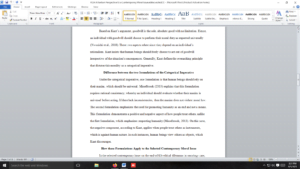Competency
Apply duty-based ethical theories to contemporary moral issues.
Instructions
In this research-based assessment, you will be applying a Kantian perspective to a contemporary moral issue. Current contemporary moral issues range from genetic engineering to issues related to the use of torture in wartime. For this assessment you will need to research contemporary moral issues and select one that will be the focus of your paper as you apply the Kantian perspective. Once you select your moral issue, you will need to address the following in a properly formatted research paper.
- Explain what duty is according to Kant and how this view differs from other senses of duty.
- Describe the relationship between a good will and duty for Kant.
- Differentiate the two formulations of the Categorical Imperative.
- How do these formulations apply to your selected contemporary moral issue?
- Using the foundation of Kant’s moral theory explain how there is a moral duty for your selected contemporary moral issues.
- Express your view as a maxim.
- How feasible is it to universalize your maxim?
- How does your maxim fulfill/satisfy each of these formulations?
In your paper, ensure that you use credible academic sources, and cite them properly.
greetings, this is the rubric
| Competence | Proficiency | Mastery | ||
| Not Submitted | An inadequate or inappropriate explanation of what duty is according to Kant and how this view differs from other senses of duty | Explains what duty is according to Kant and how this view differs from other senses of duty with supporting information. | Explains what duty is according to Kant and how this view differs from other senses of duty with strong supporting information. | Explains what duty is according to Kant and how this view differs from other senses of duty with well-integrated, strong supporting information. |
| Not Submitted | An inadequate or inappropriate description of the relationship between a good will and duty for Kant. | Describes with generalities the relationship between a good will and duty for Kant. | Adequately describes the relationship between a good will and duty for Kant. | Thoroughly describes the relationship between a good will and duty for Kant. |
| Not Submitted | An inadequate or inappropriate differentiation of the two formulations of the Categorical Imperative | Differentiates the two formulations of the Categorical Imperative with basic information. | Differentiates the two formulations of the Categorical Imperative with strong supporting information. | Differentiates the two formulations of the Categorical Imperative in strong detail and supporting information. |
| Not Submitted | Incorrectly identifies a contemporary moral issue and/or An inadequate or inappropriate discussion of how these formulations apply to the selected issue. | Correctly identifies a contemporary moral issue and discusses how these formulations apply to the selected issue with basic supporting information. | Correctly identifies a contemporary moral issue and discusses how these formulations apply to the selected issue with supporting information. | Correctly identifies a contemporary moral issue and thoroughly discusses how these formulations apply to the selected issue in strong detail and supporting information. |
| Not Submitted | An inadequate or inappropriate explanation of, using the foundation of Kant’s moral theory, how there is a moral duty for the selected issue. | Explains, using the foundation of Kant’s moral theory, how there is a moral duty for the selected issue with strong supporting evidence. | Explains, using the foundation of Kant’s moral theory, how there is a moral duty for the selected issue with supporting evidence. | Explains, using the foundation of Kant’s moral theory, how there is a moral duty for the selected issue with strong supporting evidence. |
| Not Submitted | Incorrectly creates a maxim And/or An inadequate or inappropriate explanation of how feasible is it to universalize the maxim. | Creates an applicable maxim with a sufficient explanation as to how feasible is it to universalize the maxim. | Creates an applicable maxim with a detailed explanation as to how feasible is it to universalize the maxim. | Creates an applicable maxim with a thorough and detailed explanation as to how feasible is it to universalize the maxim. |
| Not Submitted | An inadequate or inappropriate explanation of how maxim fulfill/satisfy each of the formulations. | Explains how maxim fulfill/satisfy each of the formulations with basic supporting evidence. | Explains how maxim fulfill/satisfy each of the formulations with supporting evidence. | Explains how maxim fulfill/satisfy each of the formulations with strong supporting evidence. |
Answer preview
In my view, my maxim is providing relevant and concise information that the patient deserves. Avoiding ambiguity and refraining from instilling fear and anxiety would be a moral action in the presented scenario. On this note, the use of appropriate communication tools and information interpreters where necessary would be strategic. Notably, universalizing my maxim is feasible in demonstrating the moral actions every healthcare professional should take to promote patients’ autonomy and dignity (Nwozichi et al., 2018). Generally, patients appreciate it when they are allowed to make informed decisions about their health based on the information they receive from health care workers.
[991 Words]

